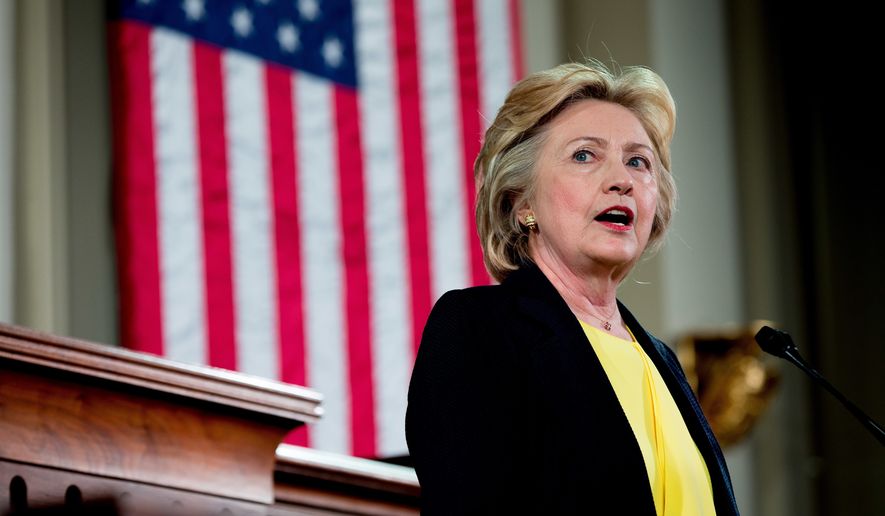A lawyer for Hillary Clinton asked a federal judge Monday to bar her from testifying under oath about her private email system, saying she’s already explained publicly her reasons for setting up the secret server as secretary of state.
“The answer’s not going to change,” attorney David Kendall told U.S. District Judge Emmett Sullivan. “It was a matter of convenience.”
Mrs. Clinton is fighting a move by the watchdog group Judicial Watch to question her under oath about her motives for creating the private mail system in 2009. FBI Director James B. Comey concluded this month that Mrs. Clinton, the presumptive Democratic nominee, was “extremely careless” with sensitive government documents, but didn’t commit any crimes.
Michael Bekesha, an attorney for Judicial Watch, said only Mrs. Clinton can answer questions about her motivations for setting up the system, and why she didn’t switch to the State Department’s official system as she became aware of her obligations for federal record-keeping and transparency.
“She hasn’t fully answered the question under oath,” Mr. Bekesha told the judge.
But Mr. Kendall argued that Mrs. Clinton has answered similar questions numerous times, in interviews, in questioning by the FBI, and in testimony to the House committee investigating the attack in Benghazi, Libya. He noted that Mr. Comey told House lawmakers this month that former President Bill Clinton already had set up a private email server, and Mrs. Clinton decided to “jump onto” his system when she became secretary of state.
“There is an abundance of evidence the system was set up for the purpose of convenience,” Mr. Kendall said. He said there is “no legal justification” for Mrs. Clinton giving a deposition under oath.
“We have nothing,” he said. “Everything has been turned over to the FBI.”
Mr. Kendall also suggested the request by Judicial Watch is motivated by her status as the presumptive Democratic nominee, implying that the group wants to use a tape for political purposes.
“There is an elephant in the room,” Mr. Kendall told the judge. “They want to take her deposition.”
Mr. Bekesha told the judge that Mrs. Clinton’s status as a major-party presidential nominee shouldn’t protect her from giving a deposition in a legal case seeking information about her secret email system as a federal official.
The judge asked whether Mrs. Clinton’s status as the presumptive Democratic nominee is “relevant” to the case, saying there is case law showing that top government figures should be shielded from answering questions in lawsuits while in office.
“That she’s a presumptive nominee doesn’t factor in to that equation,” Mr. Bakesha replied.
The judge said he would rule on the question soon. He suggested to both lawyers that it might be reasonable for Mrs. Clinton to respond under oath to written questions; Mr. Kendall requested 30 days for her to answer if the judge does decide on that course.
Judge Sullivan also pressed an attorney for the State Department, Caroline Wolverton, for a timetable to release several thousand lost emails from Mrs. Clinton’s server that were recovered by the FBI during its investigation. Ms. Wolverton said the State Department expects to receive the first batch of those emails by Friday at the latest, then the agency will begin its evaluation of which documents comply with Judicial Watch’s Freedom of Information Act request.
She said the State Department needs to make sure the emails are “in a format we can work with readily.”
“Everything is happening sort of very quickly,” said Ms. Wolverton, who agreed to provide the court with a status update on the work by July 29.
While Ms. Wolverton portrayed the batch of emails coming from the FBI as “the end point” of efforts to recover Mrs. Clinton’s emails, Mr. Bekesha said Judicial Watch might pursue “other places” in its search for her documents. He said other State Department officials may have received emails from Mrs. Clinton that haven’t shown up in the tens of thousands that have been recovered and turned over so far.
“We think there may be additional remedies, additional relief,” he told the judge.
• Dave Boyer can be reached at dboyer@washingtontimes.com.




Please read our comment policy before commenting.